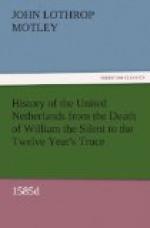All this, and much more, with florid rhetoric, the burgomaster pronounced in honour of Farnese, and the eulogy was entirely deserved. It was hardly becoming, however, for such lips, at such a moment, to sound the praise of him whose victory had just decided the downfall of religious liberty, and of the national independence of the Netherlands. His colleagues certainly must have winced, as they listened to commendations so lavishly bestowed upon the representative of Philip, and it is not surprising that Sainte Aldegonde’s growing unpopularity should, from that hour, have rapidly increased. To abandon the whole object of the siege, when resistance seemed hopeless, was perhaps pardonable, but to offer such lip-homage to the conqueror was surely transgressing the bounds of decorum.
His conclusion, too, might to Alexander seem as insolent as the whole tenor of his address had been humble; for, after pronouncing this solemn eulogy upon the conqueror, he calmly proposed that the prize of the contest should be transferred to the conquered.
“So long as liberty of religion, and immunity from citadel and garrison can be relied upon,” he said, “so long will Antwerp remain the most splendid and flourishing city in Christendom; but desolation will ensue if the contrary policy is to prevail.”
But it was very certain that liberty of religion, as well as immunity from citadel and garrison, were quite out of the question. Philip and Parma had long been inexorably resolved upon all the three points.
“After the burgomaster had finished his oration,” wrote Alexander to his sovereign, “I discussed the matter with him in private, very distinctly and minutely.”
The religious point was soon given up, Sainte Aldegonde finding it waste of breath to say anything more about freedom of conscience. A suggestion was however made on the subject of the garrison, which the prince accepted, because it contained a condition which it would be easy to evade.




